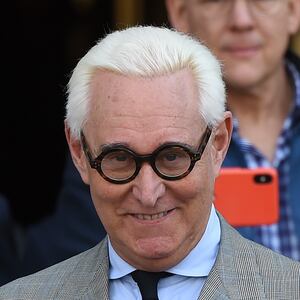Roger Stone, a longtime Trump confidant convicted of lying to Congress about his connection to WikiLeaks and intimidating another witness to do the same, had his sentence commuted by President Trump on Friday—just a few days before he was set to report to jail.
President Trump had raised the possibility of clemency almost immediately after Stone, 67, was convicted last November, often complaining—without evidence—that Stone had been treated poorly by law enforcement or targeted unfairly.
In a statement announcing Stone's clemency, the White House described Stone as “a victim of the Russia Hoax that the Left and its allies in the media perpetuated for years in an attempt to undermine the Trump Presidency.”
“Mr. Stone, like every American, deserves a fair trial and every opportunity to vindicate himself before the courts. The President does not wish to interfere with his efforts to do so,” the White House wrote. “At this time, however, and particularly in light of the egregious facts and circumstances surrounding his unfair prosecution, arrest, and trial, the President has determined to commute his sentence. Roger Stone has already suffered greatly. He was treated very unfairly, as were many others in this case. Roger Stone is now a free man!”
Grant Smith, a lawyer representing Stone, told The New York Times his client was “incredibly honored that President Trump used his awesome and unique power under the Constitution of the United States for this act of mercy.”
Likewise, many in Trumpworld rejoiced.
Michael Caputo, a close Stone friend and former Trump adviser who now serves as a senior administration official, told The Daily Beast Friday evening, “I still cannot speak to Roger [Stone] due to an unconstitutional court order, but I’ve ordered the lobster.”
Rudy Giuliani, another Trump confidant who’s served as the president’s personal lawyer, told The Daily Beast, “Justice was done. The treatment of Stone and the sentence was purely political. It was a perversion of the system of justice.”
And yet, elsewhere within the president’s inner sanctum, others were less than jubilant.
“This was a mistake,” said a senior White House official who had advised Trump against pardoning or intervening in the Stone matter. “But the president had made clear [for months] that he was going to get involved.”
This official was very much not alone in the West Wing, where various aides had for several months told the president to just stay out of it. Some had personal animus toward Stone, who has his fair share of enemies among the Trump orbit, perhaps most prominently Corey Lewandowski, the president’s former 2016 campaign manager who now works as a senior adviser to Trump 2020.
House Intelligence Committee Chairman Adam Schiff was also quick to denounce the move, saying that by granting the commutation, “Trump makes clear that there are two systems of justice in America: one for his criminal friends, and one for everyone else.”
The Biden campaign called the commutation an abuse of power and said Trump had chosen to make the move on a Friday night because he was “hoping to yet again avoid scrutiny as he lays waste to the norms and the values that make our country a shining beacon to the rest of the world.”
The commutation capped a week of mixed fortunes for Stone. He’d taken to begging Trump for a presidential pardon on Instagram after he had a last-ditch appeal denied—and before he was booted off Facebook and Instagram on Wednesday for coordinated inauthentic behavior linked to the Proud Boys far-right organization.
Hours before the presidential clemency, which came after Stone’s final request to postpone his sentencing date was denied, the 67-year-0ld told journalist Howard Fineman the president “knows I was under enormous pressure to turn on him. It would have eased my situation considerably. But I didn’t.”
On Thursday, Stone also told SiriusXM he was hoping for the pardon so he could continue to fight the charges against him in court.
“I would still have to battle it out on appeal, which frankly I want to do, because I want an opportunity to clear my name,” he said.
Stone was convicted last year of several charges, including lying to congressional investigators, witness tampering, and obstructing justice. Prosecutors argued he knowingly lied to House Intelligence Committee investigators about his attempts to learn more about Democratic Party emails hacked by Russia to hurt Hillary Clinton’s presidential campaign. In an attempt to cover his tracks, Stone then forced another witness to lie about his connections.
Stone was due to report to prison on Tuesday to serve a 40-month prison sentence after numerous attempts to appeal his sentence fell flat. Most recently, his sentence was delayed by two weeks due to coronavirus at the medium-security prison in Jesup, Georgia, where Stone was to report.
Prosecutors had initially recommended a sentence of seven to nine years for Stone but the Department of Justice headquarters stepped in to shorten it on Feb. 11, calling the prosecutor’s recommendation “extreme and excessive and grossly disproportionate to Stone’s offenses.”
Nevertheless, the department said in a Thursday court filing that they supported Stone going to prison on July 14 despite a complaint from Stone that he would be exposed to coronavirus.
Trump had called the seven to nine year prison recommendation “a horrible and very unfair situation.” “The real crimes were on the other side, as nothing happens to them. Cannot allow this miscarriage of justice!” he tweeted earlier this year.
Hours after the DOJ’s intervention, all four of the prosecutors handling Stone’s case—Aaron Zelinsky, Adam Jed, Jonathan Kravis, and Michael Marando—filed separate notices advising the judge they were withdrawing immediately.
The former Republican operative—who once worked on Nixon’s 1972 campaign—worked with Trump for decades before joining the president’s campaign just after he formally announced his bid in June 2015. Although he left just two months later, Stone was still involved behind the scenes, campaign officials said.
During his week-long trial in Washington federal court, several former members of Trump’s inner circle testified Stone was viewed at the campaign’s “access point” to WikiLeaks and its founder Julian Assange. The connection, they said, was crucial to learn information about the anti-secrecy group’s plans to publish hacked Democratic National Committee emails.
“Roger is an agent provocateur. He’s an expert in the tougher side of politics, when you’re this far behind you’re going to have to use every tool in the toolbox,” Steven Bannon, Trump’s former chief strategist, testified under subpoena during the trial.
Throughout the campaign, prosecutors said, Stone secretly passed information from WikiLeaks to the Trump team about the stolen emails—which were later released at crucial points throughout the 2016 election to help secure the Republican nomination. In September 2017, Stone then lied to congressional investigators about these communications in order to protect the president.
“Roger Stone lied to the House Intelligence Committee because the truth looked bad for the Trump campaign and the truth looked bad for Donald Trump," Zelinsky said in his opening statements.
To further cover his tracks, Stone used threats to force former stand-up comedian and radio talk-show host Randy Credico to stay silent and lie about acting as an intermediary to WikiLeaks during his congressional deposition.
“Roger Stone doesn’t get to choose which facts he thinks are important, and lie about the rest of them. The committee is entitled to the truth of facts under investigation, and wherever the truth takes them,” Assistant U.S. Attorney Jonathan Kravis said in his closing statement.
The night before his conviction, Stone allegedly asked for a presidential pardon through his most loyal ally and proxy—right-wing conspiracy theorist, Alex Jones. According to the Infowars host, Stone slipped him a message in court begging Trump for clemency because “only a miracle can save me now.”
The next day, jurors convicted the self-proclaimed “dirty trickster” after less than two days of deliberations. Before Stone could even leave the court, a White House presidential pardon petition was created. Trump attacked the guilty verdict in a tweet, calling it “a double standard.”
“So they now convict Roger Stone of lying and want to jail him for many years to come,” Trump tweeted. “Well, what about Crooked Hillary, Comey, Strzok, Page, McCabe, Brennan, Clapper, Shifty Schiff, Ohr & Nellie, Steele & all of the others, including even Mueller himself? Didn’t they lie? A double standard like never seen before in the history of our Country?”







